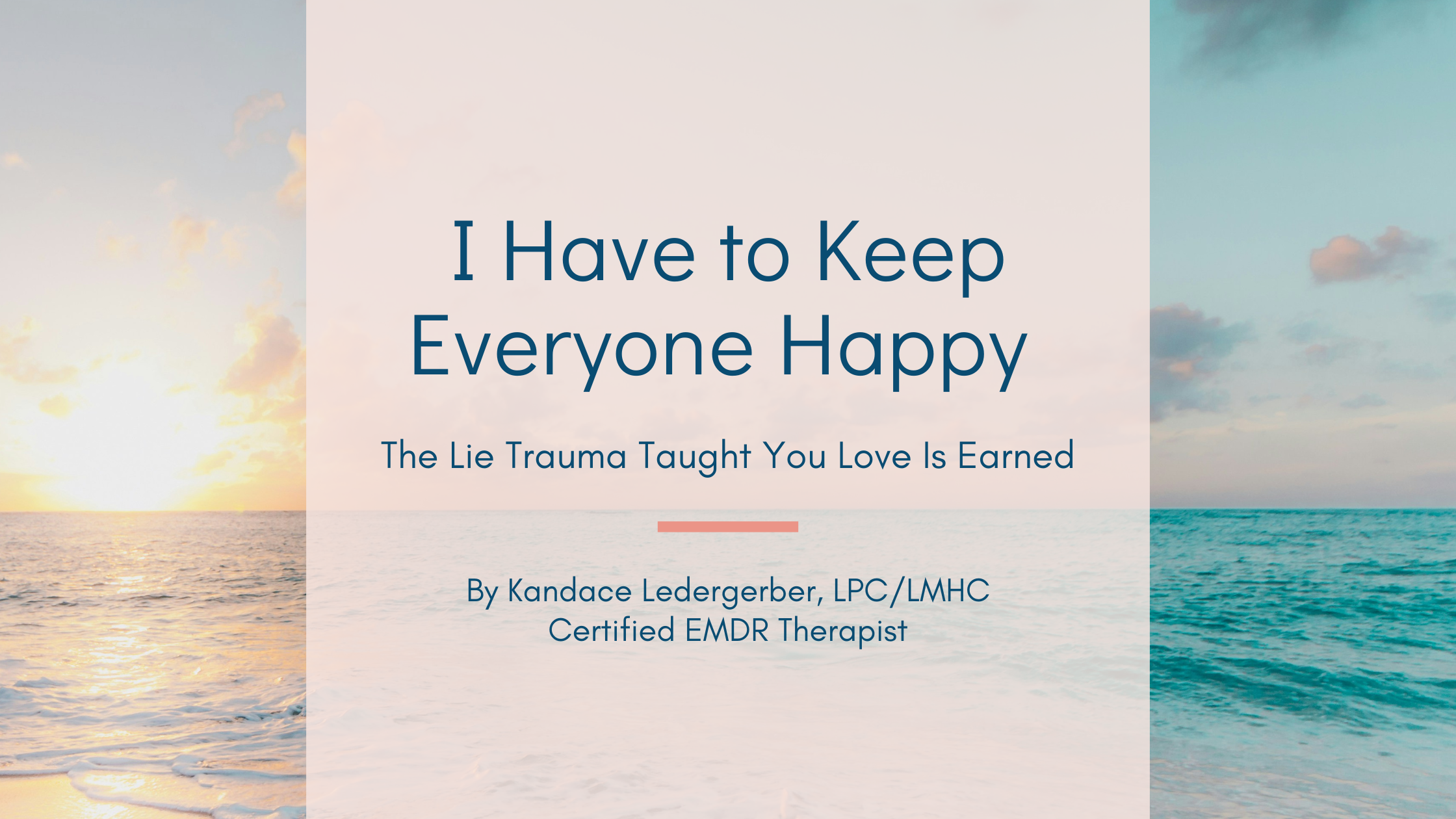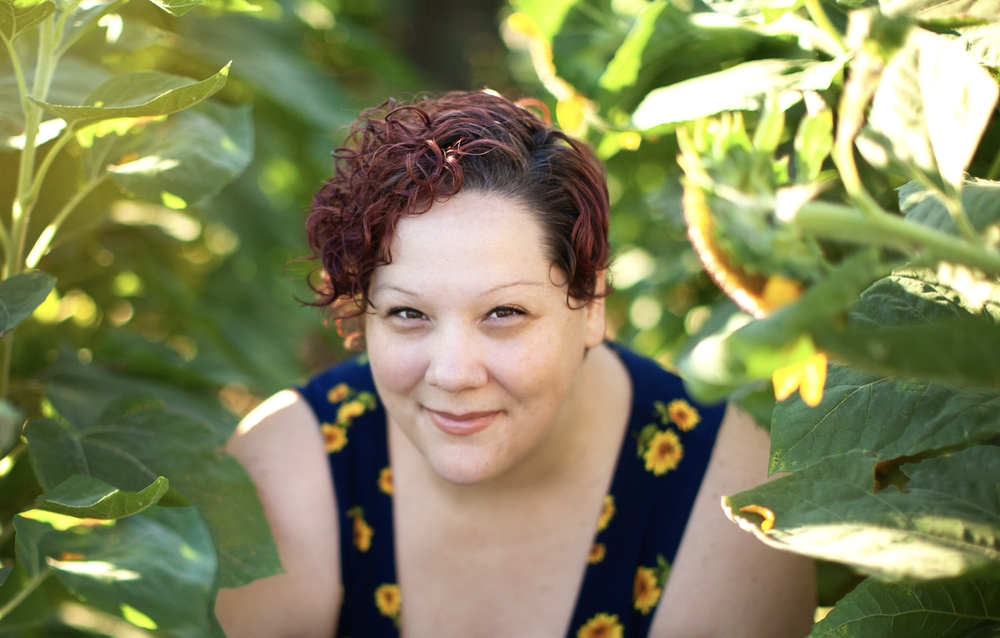I Have to Keep Everyone Happy - The Lie Trauma Taught You Love Is Earned
Photo description:
A soft, calming blog banner featuring ocean waves at sunrise with centered text reading “I Have to Keep Everyone Happy: The Lie Trauma Taught You Love Is Earned.” The image evokes emotional safety, reflection, and healing from people-pleasing patterns rooted in trauma.
Photo by Sean Oulashin on Unsplash
The Feeling of Always Managing Others
It’s a normal Tuesday afternoon. You’re trying to focus on your work when a short, vague text comes through from your partner.
Are they upset with me? Did I do something wrong? What do I need to do to fix this?
Before you even realize what’s happening, your body is already moving. Your stomach tightens. Your mind starts scanning for solutions. When you get home, you’re watching their face, their tone, their energy—trying to figure out what’s wrong and how to make it better before anything escalates.
This isn’t overreacting.
This is a trauma response.
This isn’t a flaw or something that needs fixing. It’s a survival pattern that once helped you feel safe.
(If this pattern feels familiar, it can often overlap with other nervous-system responses that I talk about in When Trauma Triggers Take Over: Understanding Your Nervous System & How EMDR Therapy Helps You Heal)
What’s Really Going On — How Trauma Taught You to Earn Love
For many people, this pattern formed early.
As children, we adapt to the emotional environments we’re raised in. When love, attention, or safety felt unpredictable, the nervous system learned a quiet rule:
If everyone else is okay, then I’m safe.
Children who take on this role become experts at emotional scanning. They learn to read facial expressions, moods, and tone shifts. They anticipate explosions before they happen. They soothe, appease, or perform—because calm in the environment equals safety in the body.
Over time, love starts to feel conditional. Something earned through behavior, compliance, or emotional caretaking.
And when you look at it through that lens, it makes complete sense. No child willingly stops a strategy that helps them feel accepted, protected, or loved.
This is why, as an adult, your body may still believe:
• Someone else’s discomfort is dangerous
• Disappointment means rejection
• Rest or saying no risks losing connection
This isn’t a weakness. It’s an adaptation your brain made to feel safer.
Why It Matters — The Cost of People-Pleasing
Photo description: A red heart spray-painted on a textured concrete wall glows in the golden light of sunset. It represents enduring love and the strength to heal after hardship—an image of self-compassion and emotional resilience.
Photo by Dan Meyers on Unsplash
The children who learned to manage everyone’s emotions often grow into adults who continue that same pattern — because the nervous system still believes it’s the only way to stay connected (and after all, connection at one point meant survival).
Constant people-pleasing eventually leads to anxiety, burnout, loss of identity, and even resentment. You may feel responsible for everyone’s feelings, hyperaware of others’ moods, and exhausted by the weight of holding it all.
And here’s the hard part — the world tends to reward this role. Workplaces and relationships may start to expect you to be the one who fixes everything, keeps the peace, and holds it all together.
For many trauma survivors, perfectionism becomes another way to manage safety. When being capable, agreeable, or “getting it right” once reduced conflict or earned approval, the nervous system often leans into over-functioning rather than rest. I explore this dynamic more deeply in Why Perfectionism Can Feel Safer Than Stillness | EMDR Therapy Phoenix.
But beneath that praise is often a quiet grief and a longing to stop managing, fixing, and holding everything together.
This is especially common for adults healing from family-of-origin trauma, where early roles shaped how safety, love, and belonging were experienced.
But here’s the thing — that doesn’t have to be your narrative any longer.
A Note on Safety and Survival
For some people, this role of keeping everyone happy isn’t just emotional — it’s been tied to literal safety. If you’ve been in a relationship or environment where walking on eggshells kept you from being harmed, your body’s instincts make perfect sense.
Healing does not mean suddenly setting boundaries that put you at risk.
It means finding safety first—through therapy, support systems, trusted people, or community resources—and slowly unlearning the belief that love must be earned through self-erasure.
If you are currently in an unsafe or abusive situation, your responses make sense. You are not failing healing by prioritizing safety.
If you need immediate support, the National Domestic Violence Hotline offers 24/7 confidential help at (800) 799‑7233 or by texting START to 88788.
Practical Tools — First Steps to Begin Unlearning
Let’s be real — slowing down or saying no will probably feel uncomfortable at first. That discomfort doesn’t mean you’re doing it wrong; it means your body is learning something new.
When you notice yourself going into over-apology mode or feeling the pull to fix someone else’s mood, try these steps (as long as you’re safe to do so):
Photo description: A close-up of a hand gently releasing small white petals against a warm, glowing sky. The image conveys the emotional process of release, safety, and transformation—aligning with trauma recovery and EMDR work.
Photo by Michelle McEwen on Unsplash
Notice and Ground. Recognize the guilt or anxiety rising up. Take a few deep breaths, letting your belly expand. On the exhale, drop your shoulders. Feel your feet on the floor or place a hand over your heart.
Name It. Silently say to yourself, “This is my people-pleasing part trying to protect me.”
Reflect. Ask: “What if their happiness isn’t my job right now?”
Decide What You Need. Do you need a boundary? A pause before saying yes? A moment to check in with your own needs?
Act and Reflect. If you say no or express a need, notice what happens next. If the other person reacts poorly, that’s a data point — not a failure. If they respond kindly, use that as to understand that safety doesn’t depend on perfection.
If you want to learn more about boundary setting, check out Boundaries For Trauma Survivors: A Step-by-Step Guide to Feeling Safe While Setting Limits.
How EMDR Therapy Helps Untangle This Belief
EMDR Therapy works by helping the brain and body reprocess the experiences that taught you:
I have to keep everyone happy to be safe or loved.
Rather than just talking about people‑pleasing, EMDR helps access the memories and nervous‑system responses where this belief was wired.
We start by building grounding and regulation skills so your body feels supported in the present. From there, we gently reprocess the earlier experiences that taught love was conditional.
Over time, many clients begin to internalize new truths like:
• I can be loved even if someone is disappointed.
• Other people’s emotions aren’t emergencies.
• I’m allowed to rest without earning it.
If you’re newer to EMDR, you may want to start with EMDR Therapy Phoenix: A Trauma Therapist’s Complete Guide to Moving Forward and Hope to understand how this work supports nervous‑system healing.
In my trauma therapy practice in Phoenix and through online EMDR across Arizona, I help clients rebuild a sense of safety that doesn’t depend on constant caretaking.
Permission Slip
You don’t have to keep performing the role of the peacemaker to deserve love (HINT: You deserve love just by being a living, breathing human being). You were never meant to carry everyone’s emotions, nor were you meant to hold the peace at your own expense.
Healing is the quiet unlearning — the moment your body begins to trust that safety doesn’t depend on perfection, control, or constant caretaking.
It’s the moment you start to rest. To breathe. To realize that love can be received, not earned.
You’re allowed to take up space, even if someone else is uncomfortable.
You’re allowed to rest, even when there’s still tension around you.
You’re allowed to feel safe in your own body.
And that’s the kind of peace I’ve seen EMDR Therapy help clients find — the kind that begins from within. If you’re interested in learning more about EMDR Therapy in Phoenix and are ready to set up a free consult, click the button below and find a time that works for you.
About the Author
Photo description: Kandace Ledergerber, a certified EMDR therapist in Phoenix and Tempe, Arizona, smiles surrounded by tall sunflower plants. Sunlight filters through the leaves, evoking warmth, compassion, and safety — qualities central to her trauma therapy practice.
Kandace Ledergerber, LPC/LMHC, is a certified EMDR therapist offering EMDR therapy in Phoenix and Tempe, Arizona, as well as virtual EMDR therapy for clients in Florida. She works with adults healing from trauma, attachment wounds, anxiety, and long-standing survival patterns such as people-pleasing, overthinking, and emotional self-silencing.
Kandace specializes in trauma-informed EMDR therapy and EMDR Intensives, helping clients move out of survival mode and into greater nervous system safety, self-trust, and emotional freedom.
👉 Learn more about EMDR therapy services in Phoenix and Tempe here.
💛 TL;DR
You learned to keep everyone happy because, at one point, it was the only way to feel safe and loved.
That instinct — to fix, soothe, or anticipate others’ emotions — is a trauma response, not a personal flaw.
Your body still believes safety depends on keeping others calm, but it’s possible to teach it a new message.
Healing starts by pausing, noticing the urge to please, and reminding yourself: Their happiness isn’t my job.
EMDR Therapy in Phoenix may be the help you are looking for to allow your body to unlearn that love has to be earned — and begin to feel safe simply being you.
🌿 Continue the Journey — The “Unlearning the Lies Trauma Taught You” Series
If this post resonated with you, it’s part two of my Unlearning the Lies Trauma Taught You series — a collection exploring how trauma shapes the roles we play in relationships and how healing helps us find who we truly are.
💛 Part 1: The Lies Trauma Taught You: How Survival Roles Shape the Way We Show Up in the World
🌿 Part 3 (coming soon): I Have to Fix It — The Lie Trauma Taught You Control Equals Safety
🌸 Part 4 (coming soon): I’m Too Much — The Lie Trauma Taught You to Shrink to Stay Loved
Each post offers reflection, validation, and tools for gentle self-unlearning — because healing isn’t about changing who you are, it’s about remembering who you’ve always been.
Reader Reflection Prompt
When you notice the urge to manage someone else’s feelings, pause and ask:
What part of me is trying to feel safe right now? And what would it sound like to offer that part the same care I give everyone else?




